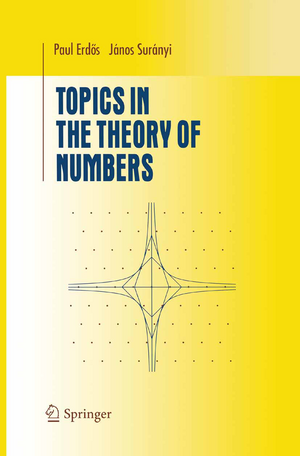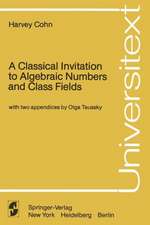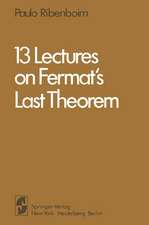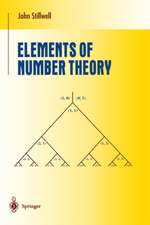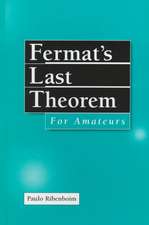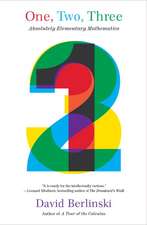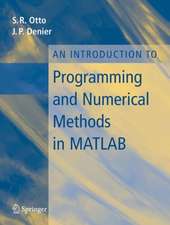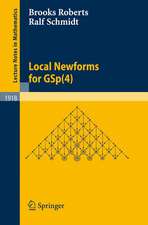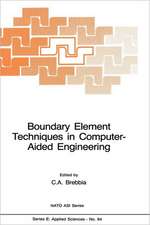Topics in the Theory of Numbers: Undergraduate Texts in Mathematics
Autor Janos Suranyi Traducere de B. Guiduli Autor Paul Erdösen Limba Engleză Hardback – 14 ian 2003
| Toate formatele și edițiile | Preț | Express |
|---|---|---|
| Paperback (1) | 389.11 lei 6-8 săpt. | |
| Springer – noi 2012 | 389.11 lei 6-8 săpt. | |
| Hardback (1) | 504.99 lei 6-8 săpt. | |
| Springer – 14 ian 2003 | 504.99 lei 6-8 săpt. |
Din seria Undergraduate Texts in Mathematics
- 17%
 Preț: 362.13 lei
Preț: 362.13 lei - 17%
 Preț: 365.43 lei
Preț: 365.43 lei -
 Preț: 332.02 lei
Preț: 332.02 lei -
 Preț: 440.01 lei
Preț: 440.01 lei -
 Preț: 351.54 lei
Preț: 351.54 lei - 13%
 Preț: 389.61 lei
Preț: 389.61 lei - 8%
 Preț: 384.89 lei
Preț: 384.89 lei -
 Preț: 290.80 lei
Preț: 290.80 lei -
 Preț: 400.43 lei
Preț: 400.43 lei -
 Preț: 449.62 lei
Preț: 449.62 lei -
 Preț: 402.35 lei
Preț: 402.35 lei -
 Preț: 372.27 lei
Preț: 372.27 lei - 17%
 Preț: 367.24 lei
Preț: 367.24 lei -
 Preț: 424.14 lei
Preț: 424.14 lei -
 Preț: 398.78 lei
Preț: 398.78 lei -
 Preț: 257.71 lei
Preț: 257.71 lei -
 Preț: 306.96 lei
Preț: 306.96 lei -
 Preț: 367.41 lei
Preț: 367.41 lei -
 Preț: 380.27 lei
Preț: 380.27 lei -
 Preț: 280.65 lei
Preț: 280.65 lei -
 Preț: 298.01 lei
Preț: 298.01 lei -
 Preț: 407.96 lei
Preț: 407.96 lei -
 Preț: 359.49 lei
Preț: 359.49 lei -
 Preț: 415.95 lei
Preț: 415.95 lei -
 Preț: 400.43 lei
Preț: 400.43 lei -
 Preț: 407.63 lei
Preț: 407.63 lei -
 Preț: 358.11 lei
Preț: 358.11 lei - 17%
 Preț: 368.61 lei
Preț: 368.61 lei -
 Preț: 370.78 lei
Preț: 370.78 lei -
 Preț: 395.09 lei
Preț: 395.09 lei -
 Preț: 364.41 lei
Preț: 364.41 lei -
 Preț: 339.37 lei
Preț: 339.37 lei -
 Preț: 304.91 lei
Preț: 304.91 lei -
 Preț: 433.85 lei
Preț: 433.85 lei - 15%
 Preț: 417.75 lei
Preț: 417.75 lei - 17%
 Preț: 362.67 lei
Preț: 362.67 lei - 20%
 Preț: 466.84 lei
Preț: 466.84 lei - 19%
 Preț: 400.52 lei
Preț: 400.52 lei - 17%
 Preț: 373.60 lei
Preț: 373.60 lei - 17%
 Preț: 395.93 lei
Preț: 395.93 lei -
 Preț: 329.95 lei
Preț: 329.95 lei - 19%
 Preț: 492.83 lei
Preț: 492.83 lei -
 Preț: 396.24 lei
Preț: 396.24 lei -
 Preț: 390.08 lei
Preț: 390.08 lei
Preț: 504.99 lei
Preț vechi: 594.10 lei
-15% Nou
Puncte Express: 757
Preț estimativ în valută:
96.63€ • 103.33$ • 80.57£
96.63€ • 103.33$ • 80.57£
Carte tipărită la comandă
Livrare economică 18 aprilie-02 mai
Preluare comenzi: 021 569.72.76
Specificații
ISBN-13: 9780387953205
ISBN-10: 0387953205
Pagini: 287
Ilustrații: XVIII, 287 p. 3 illus.
Dimensiuni: 155 x 235 x 20 mm
Greutate: 0.58 kg
Ediția:2003
Editura: Springer
Colecția Springer
Seria Undergraduate Texts in Mathematics
Locul publicării:New York, NY, United States
ISBN-10: 0387953205
Pagini: 287
Ilustrații: XVIII, 287 p. 3 illus.
Dimensiuni: 155 x 235 x 20 mm
Greutate: 0.58 kg
Ediția:2003
Editura: Springer
Colecția Springer
Seria Undergraduate Texts in Mathematics
Locul publicării:New York, NY, United States
Public țintă
Lower undergraduateCuprins
1. Divisibility, the Fundamental Theorem of Number Theory.- 2. Congruences.- 3. Rational and Irrational Numbers. Approximation of Numbers by Rational Numbers (Diophantine Approximation).- 4. Geometric Methods in Number Theory.- 5. Properties of Prime Numbers.- 6. Sequences of Integers.- 7. Diophantine Problems.- 8. Arithmetic Functions.- Hints to the More Difficult Exercises.
Recenzii
From the reviews:
"Read this book just for Erdös’s (Erdos’s) characteristic turn of thought, or for results hard to find elsewhere, such as a finiteness theorem concerning odd perfect numbers with a fixed number of factors. Summing Up: Recommended. Lower-division undergraduates through professionals." (D.V. Feldman, CHOICE, December, 2003)
"This is an English translation of the second edition of a book originally published over 40 years ago … . The contents should be accessible to, and inspire and challenge, keen pre-university students as well as giving the experienced mathematician food for thought. The proofs are elementary and largely self-contained, and the problems and results well motivated. … This translation makes a very clearly and nicely written book available to many more readers who should benefit and gain much pleasure from studying it." (Eira J. Scourfield, Zentralblatt MATH, Issue 1018, 2003)
"This rather unique book is a guided tour through number theory. While most introductions to number theory provide a systematic and exhaustive treatment of the subject, the authors have chosen instead to illustrate the many varied subjects by associating recent discoveries, interesting methods, and unsolved problems. … János Surányi’s vast teaching experience successfully complements Paul Erdös’s ability to initiate new directions of research by suggesting new problems and approaches." (L’Enseignement Mathematique, Vol. 49 (1-2), 2003)
"This is a somewhat enlarged translation of the Hungarian book … . It goes without saying that the text is masterly written. It contains on comparatively few lines the fundamental ideas of not only elementary Number Theory: it contains also irrationality proofs ... . The book is hence by far not an n-th version of always the same matter. The style reminds me on the celebrated book of Pólya … . It is desirable that the book under discussion should have a similarsuccess." (J. Schoissengeier, Monatshefte für Mathematik, Vol. 143 (2), 2004)
"This an introduction to elementary number theory in which the authors present the main notions of that theory and ‘try to give glimpses into the deeper related mathematics’, as they write in the preface. There are 8 chapters … . Each of them brings not only the notions and theorems (sometimes with unconventional proofs) which usually appear in introductory texts, but discusses also topics found rarely … . One also finds several interesting historical comments." (W. Narkiewicz, Mathematical Reviews, 2003j)
"Read this book just for Erdös’s (Erdos’s) characteristic turn of thought, or for results hard to find elsewhere, such as a finiteness theorem concerning odd perfect numbers with a fixed number of factors. Summing Up: Recommended. Lower-division undergraduates through professionals." (D.V. Feldman, CHOICE, December, 2003)
"This is an English translation of the second edition of a book originally published over 40 years ago … . The contents should be accessible to, and inspire and challenge, keen pre-university students as well as giving the experienced mathematician food for thought. The proofs are elementary and largely self-contained, and the problems and results well motivated. … This translation makes a very clearly and nicely written book available to many more readers who should benefit and gain much pleasure from studying it." (Eira J. Scourfield, Zentralblatt MATH, Issue 1018, 2003)
"This rather unique book is a guided tour through number theory. While most introductions to number theory provide a systematic and exhaustive treatment of the subject, the authors have chosen instead to illustrate the many varied subjects by associating recent discoveries, interesting methods, and unsolved problems. … János Surányi’s vast teaching experience successfully complements Paul Erdös’s ability to initiate new directions of research by suggesting new problems and approaches." (L’Enseignement Mathematique, Vol. 49 (1-2), 2003)
"This is a somewhat enlarged translation of the Hungarian book … . It goes without saying that the text is masterly written. It contains on comparatively few lines the fundamental ideas of not only elementary Number Theory: it contains also irrationality proofs ... . The book is hence by far not an n-th version of always the same matter. The style reminds me on the celebrated book of Pólya … . It is desirable that the book under discussion should have a similarsuccess." (J. Schoissengeier, Monatshefte für Mathematik, Vol. 143 (2), 2004)
"This an introduction to elementary number theory in which the authors present the main notions of that theory and ‘try to give glimpses into the deeper related mathematics’, as they write in the preface. There are 8 chapters … . Each of them brings not only the notions and theorems (sometimes with unconventional proofs) which usually appear in introductory texts, but discusses also topics found rarely … . One also finds several interesting historical comments." (W. Narkiewicz, Mathematical Reviews, 2003j)
Textul de pe ultima copertă
This rather unique book is a guided tour through number theory. While most introductions to number theory provide a systematic and exhaustive treatment of the subject, the authors have chosen instead to illustrate the many varied subjects by associating recent discoveries, interesting methods, and unsolved problems. In particular, we read about combinatorial problems in number theory, a branch of mathematics co-founded and popularized by Paul Erdös. Janos Suranyis vast teaching experience successfully complements Paul Erdös'ability to initiate new directions of research by suggesting new problems and approaches. This book will surely arouse the interest of the student and the teacher alike.
Until his death in 1996, Professor Paul Erdös was one of the most prolific mathematicians ever, publishing close to 1,500 papers. While his papers contributed to almost every area of mathematics, his main research interest was in the area of combinatorics, graph theory, and number theory. He is most famous for proposing problems to the mathematical community which were exquisitely simple to understand yet difficult to solve. He was awarded numerous prestigious prizes including the Frank Nelson Cole prize of the AMS.
Professor Janos Suranyi is a leading personality in Hungary, not just within the mathematical community, but also in the planning and conducting of different educational projects which have led to a new secondary school curriculum. His activity has been recognized by, amongst others, the Middle Cross of the Hungarian Decoration and the Erdös Award of the World Federation of National Mathematical Competitions.
Until his death in 1996, Professor Paul Erdös was one of the most prolific mathematicians ever, publishing close to 1,500 papers. While his papers contributed to almost every area of mathematics, his main research interest was in the area of combinatorics, graph theory, and number theory. He is most famous for proposing problems to the mathematical community which were exquisitely simple to understand yet difficult to solve. He was awarded numerous prestigious prizes including the Frank Nelson Cole prize of the AMS.
Professor Janos Suranyi is a leading personality in Hungary, not just within the mathematical community, but also in the planning and conducting of different educational projects which have led to a new secondary school curriculum. His activity has been recognized by, amongst others, the Middle Cross of the Hungarian Decoration and the Erdös Award of the World Federation of National Mathematical Competitions.
